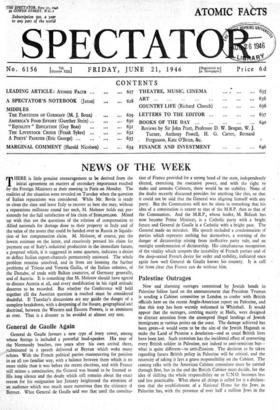General de Gaulle Again
General de Gaulle favours a new type of ivory tower, among whose fittings is included a powerful loud-speaker. His tour of the Normandy beaches, two years after his own arrival there, culminated in a speech delivered at Bayeux which woke many echoes. With the French political parties manoeuvring for position in an all too familiar way, with a balance between them which is no more stable than it was before the recent elections, and with France still minus a constitution, the General was bound to be listened to His long silence and the doubt which still remains about the exact reason for his resignation last January heightened the attention of an audience which was much more numerous than the citizenry of Bayeux. What General de Gaulle said was that until the constitu-
tion of France provided for a strong head of state, independently elected, exercising the executive power, and with the right to make and unmake Cabinets, there would be no stability. None of the drafts recently discussed provides for anything like this, so that it could not be said that the General was aligning himself with any party. But the Communists will not be alone in remarking that his idea of a constitution is nearer to that of the M.R.P. than to that of the Communists. And the M.R.P., whose leader, M. Bidault has now become Prime Minister, is a Catholic party with a bright future and General de Gaulle is a Catholic with a bright past. The General made no mistakes. His speech included a condemnation of parties which represent nothing but themselves, a warning of the danger of dictatorship arising from ineffective party rule, and an outright condemnation of dictatorship. His simultaneous recognition of the vitality which tempers the instability of French parties and of the deep-seated French desire for order and stability, indicated once again how well General de Gaulle knows his country. It is suit far from clear that France can do without him.


























